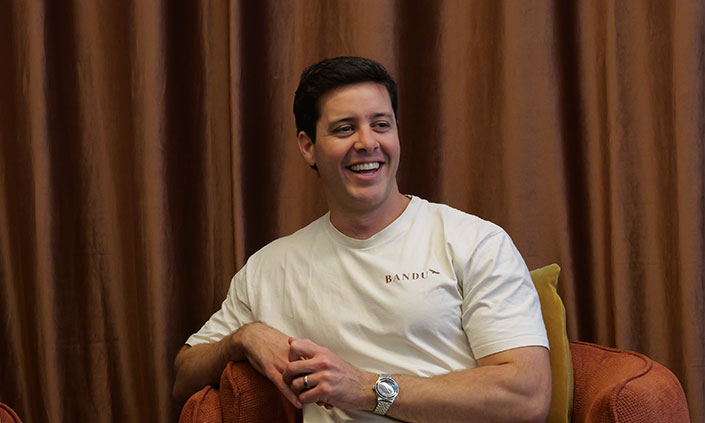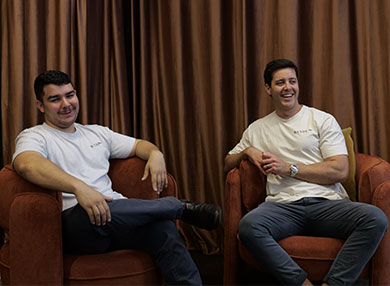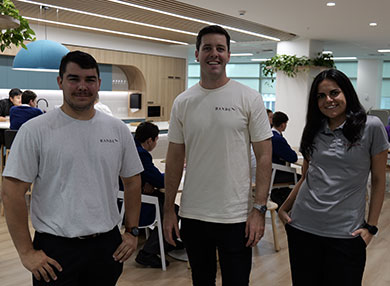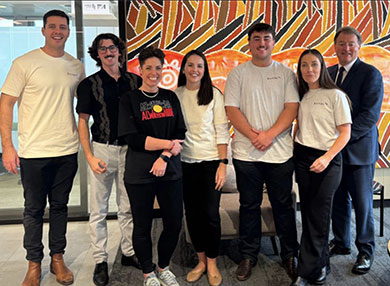Soar like an eagle
Growing up near Macquarie and with ties to the East Kimberley, Edward Morgan co-founded Bandu to help Indigenous students thrive at university.

Over ten years ago, just 37 per cent of First Nations students were completing Year 12. That figure is now 65 per cent. But, of those who go on to tertiary education, whether university or TAFE, only 26 per cent complete their qualifications. "It really grinds my gears," says Edward Morgan, who knew exactly why this was happening – and was determined to change it.
As an early career teacher, he’d been working at St Joseph’s College in Sydney with Indigenous scholarship students, and had seen firsthand the difference wraparound support makes in the senior years – something that fell off entirely after school. But the seeds of Mr Morgan’s career and Bandu, the not-for-profit he cofounded, were sown even earlier.
"I’m not Indigenous," says Mr Morgan, who’s known as Morgo to his students. "But I’ve always been passionate about Aboriginal education and outcomes for Aboriginal people. My first cousins are Kija and Ngarinyin people from the East Kimberley, and I have a strong connection to the Indigenous community out there – it’s incredible being able to go onto native title country and hang out with my cousins."
Even though it would take a while to realise his calling in education, Mr Morgan always knew he would end up at Macquarie University. "I’m a local boy, played rugby for Eastwood and trained at Macquarie, and did my Year 11 community service at a school for children with high special needs at the end of Wally’s Walk. I loved helping the kids with their lessons, and there was a great energy on campus. I wasn’t weighing up different universities – Macquarie was always where I was going to go."
Initially, Mr Morgan enrolled in international studies/law, but after returning from a gap year working at a boarding school in the UK, he quickly changed over to an arts/education degree. "I loved being in a school surrounded by kids all the time – that’s when I knew I wanted to be a high school teacher. I’ve never looked back."
He was right at home studying teaching, which as a combined degree meant he could do subjects like educational psychologist right from the start. "I majored in history with a minor in English, and was offered a full-time position as an English teacher at The Armidale School in my final year. It came with a cottage and was a great opportunity – ten or 11 years ago, there were so many unemployed teachers – but the timing was terrible. I was in the middle of a practicum and still had two subjects to go, so needed permission from the head of department. Dr Judy Adnum in the teaching faculty was remarkable. She put her neck on the line for me, saying she’d personally see that I completed my last four assessments – that meant a lot to me."
With the Armidale School agreeing to sign off on his practicum, Mr Morgan moved for term 4 in 2014. "I was teaching HSC Standard and Advanced English, running a middle school homeroom, coaching sport and loving it, but was also completing my degree. It was hard, but I wanted to come through for Judy – she had my back the whole time and was a phenomenal educator."
In 2015, Mr Morgan needed to return to Sydney, so took a position at St Joseph’s, which also had a boarding school. "You see the students in a completely different way outside the classroom," he explains. "It’s their home – you can be there with them, help them with their homework, have a chat about life on the farm or how their sport is going. It pays huge dividends in the classroom, and you become a real part of the school community."
With another offer on the table, Mr Morgan says it was a sliding-door moment. "I've been fortunate to have some great people – teachers, mentors and family – to help me make good decisions along the way, so I know just how important this kind of support is when you’re starting out."
Mr Morgan was at Joey’s for eight years, and it didn’t take long for the Indigenous boarders to seek him out and share their struggles. "When they found out I’ve got Aboriginal family, and knew my cousin at another school who got into the AFL, they were like, that’s deadly. They could relate to me and word started to spread – go talk to Morgo, he’ll get it, they’d say. But it quickly became unsustainable – they needed a dedicated person to support them and make sure they were feeling culturally safe in this old, religious institution."
And so the school created a role for Mr Morgan to oversee the Indigenous program, providing pastoral care from enrolment. "I’d drive out to the communities, meet the students and their families, and help them when they started, anything from getting a train or bus ticket, to some petrol for the car, or a motel room for whoever was taking them to Sydney.
"Then there were all the little things to make sure their journey through school was smooth – helping them with their academic work, making sure they had access to cultural connection and education, even getting them mouthguards for footy.
"A whole-school cultural shift was required, so we did things that seem normal now, but 10 years ago flying a flag or leading an assembly with an acknowledgement of country just didn’t happen. With around 50 boys and families a year, it was crucial for their sense of identity."
Things were moving in the right direction, but Mr Morgan was only just getting started, and progressed to designing a post-school program for Aboriginal students. "I knew that while they did well at high school, they struggled afterward – and that was consistent with my major research projects at Macquarie, where I investigated the success of boarding school programs for Indigenous kids and the need for cultural awareness in schools with scholarship programs."
Unfortunately, Mr Morgan didn’t have the resources to support the students post-school while teaching full-time, so the program didn’t continue. But not all was lost. Some of his students succeeded, and one of them was Aidan Porter, Mr Morgan’s Bandu cofounder. "He’d been a student of mine, had done a gap year and was undertaking a business degree at Macquarie while working at Joey’s as a cultural tutor.
"He was the first in his family to go to university, and living away from home and working. Speaking with him and his family, we realised that what had worked for him was the four pillars that were embedded in the school program (and are now in Bandu’s post-school program) – education, accommodation, employment and community.

"It was clear the program was structurally sound, and we knew there was a real need for a specialist organisation and support system for First Nations kids after they finished school, but there was no-one to run it. That's why we established Bandu," says Mr Morgan proudly, who resigned from Joey’s at the end of 2022 to start the organisation. "I had a mortgage, my wife was pregnant, and with no guarantee of any income, we started a company designed not to make a profit," he says.
"The week after my last day at Joey's, we signed Knight Frank Australia as a major partner and started supporting 15 kids. Two years later, we’ve got over 130 kids – they’re happy, they’re completing tertiary qualifications, they’re making money and have a roof over their head, and they're keen to go on and be a positive influence in their community."
And that’s the whole point. "Bandu is a Wiradjuri word that means fly – Aidan is a Wiradjuri man, and Bandu reflects the idea that we want our kids to leave the nest, we want them to fly after school. That’s why we use the motif of the red-tailed eagle, a sacred symbol in First Nations culture across the East Coast – we want our kids to soar like eagles."
Bandu now has 15 schools on board and 15 partners, and in early 2023 Mr Morgan was able to take a salary. "Things kicked off quickly, and there’s a lot of growth ahead. We’re expanding to other states, but we’re making sure that the quality of the relationships we’re building, the care we’re providing, remains high."

To do this, Bandu is increasing the number of engagement officers on the ground, employing Aboriginal people in these positions. "We want to walk our talk," says Mr Morgan. ‘Being a financially sustainable charity is important too, so we’re keen to speak with corporates about employment opportunities and support for building culturally safe housing for First Nations apprentices relocating from rural and remote areas to pursue trades.
"There’s the bigger picture at play too. Just after school, from 18 to 25, is the period that is the biggest hole in the closing the gap and reconciliation process," says Mr Morgan. "The rates of high school completion are growing faster than ever before, but there's absolutely no growth in the rate of completion of tertiary education – it’s stagnated at 47 per cent.
"That’s why we meet the kids in Year 10, and maintain relationships after Year 12 – we have really strong relationships with them and their families, and their communities. The goal is for them to go back home with a degree or a trade, and be a role model. That’s what we're trying to do."
For someone who’s always been passionate about helping others pursue their aspirations, and making sure there’s enough tolerance and compassion in society to allow for that, Mr Morgan is in his element. "Bandu ensures that these young people, who start from a place of systemic disadvantage, aren’t impacted by that their whole lives. If we can remove a few roadblocks, they'll be able to access the same high levels of education and employment that everyone else can. That's what I’m really passionate about."

Edward Morgan's bio
Edward Morgan GAICD graduated from Macquarie University in 2015 with a Bachelor of Arts/Diploma of Education. He is the Co-Founder and Managing Director of Bandu Organisation, a nationally recognised charity dedicated to empowering First Nations young people to transition successfully from high school into tertiary education and meaningful employment. Drawing on his background in teaching, school leadership, and policy development, Mr Morgan established Bandu in 2022 to address the systemic barriers that contribute to low university completion rates and employment outcomes for Aboriginal and Torres Strait Islander students.
Mr Morgan grew up in Eastwood, Sydney, as one of six children in a close-knit family that instilled in him the values of service, hard work and humility. A lifelong lover of sport, particularly rugby, he has always found purpose in coaching and mentoring young people, helping them uncover their strengths and strive for excellence both on and off the field. This passion continues to inform his work at Bandu, where the emphasis on personal relationships and holistic support is at the core of the organisation’s success.
A graduate of the Australian Institute of Company Directors, Mr Morgan brings strong governance, stakeholder engagement and strategic planning capabilities to his work. Since launching Bandu, he has secured partnerships with top schools, corporates and philanthropic organisations, led the growth of a First Nations housing program, and overseen the development of tailored support pathways for over 120 students across Australia. He is a passionate advocate for educational equity and continues to work closely with government and industry leaders to ensure every young person in the Bandu community has the support, opportunity and cultural safety they deserve.